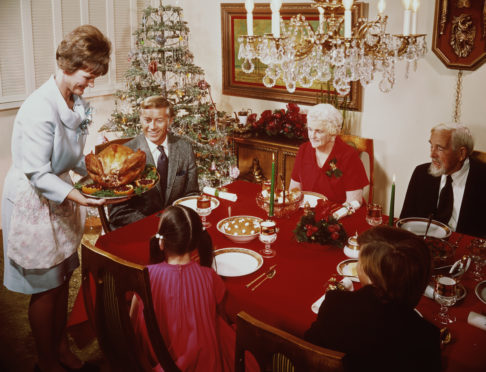For many people the days that follow Christmas Day have a clear purpose: finding bargains in the sales.
Many unwanted gifts will be returned to the store, or at least swapped for something more desirable. After Christmas is a great time to downsize possessions through giving unwanted items to charity shops.
One ‘gift’ that we cannot take back, swap or recycle is the gift of our family. But perhaps on this the third day of Christmas you might be wishing that you had one of these options.
In the weeks running up to Christmas images of happy family life were everywhere.
Adverts showed us families gathered around tables laden with food, raising glasses of good cheer. Everywhere there were smiling faces, family members and their friends were delighted to be together. Old and young were getting along with each other. Everyone was helpful.
All of this might have helped us to approach Christmas optimistically with hopes raised. No matter what Christmas might have been like in the past, this year was going to be a happy one. And maybe it was just like this in your home this year.
Or maybe not. Maybe this Christmas was one of barely-covered tensions, bad tempers, and a lack of help and gratitude. Maybe, in the middle of the stress of Christmas Day, this was when your family decided to have a bit of a row. We expect families to get on well at Christmas, but why should they when they might have struggled to be happy together and agree with one another throughout the rest of the year?
What if a brother and sister had fallen out with one another during the year and were not yet properly over it? What if a grandparent was sad and reminiscent, and had a little cry in the middle of the Christmas lunch?
What if the children were too noisy playing, or too quiet because they were all on their phones? What if families had been divided by separation or divorce, so that those present were angry about who was missing and why? What if one person did not pull their weight in making a contribution or helping out? What if another held forth on a subject not usually discussed, like politics or religion, and just would not shut up?
The reality of course is that our families are much more complicated and tricky than those shown in the Christmas adverts. As families, by definition, we have history with each other and, like elephants , there are always things that we don’t forget. We might have intended this year to be different, to give others a fresh start, to be forgiving, but it is the same things that niggle us year after year.
We can have an unrealistic expectation that people will change for the better. Sadly, especially in families, this is not often true. It is much more likely that when a family gathers, it slips back into old patterns of behaviour that have been maintained over years. Adults behave like they did when they were children, old rivalries surface. We ourselves might want to be better people, but in the midst of our family on a stressful day we just don’t quite manage it.
The reality is that we are who we are. The older we become, the more true this is. What we want is for people to accept us and love us the way we are now, without conditions. We want to be able to be ourselves. In fact we are much more likely to change our minds, our attitudes, our behaviours if we are loved unconditionally.
For all of us there are family members who we have to decide to love. We might wish we had another family, but we do not get this choice.
We have to take what we are given and work with it. With some family members we might not see much that is loveable, but if we take time there is usually something, however small.
At this festive season we give our families time, because this is the loving and generous thing to do. A little kindness towards those who are closest to us goes a long way.
If an elderly family member lives alone, then at Christmas it means a great deal to be able to have someone to listen to their stories. You might have heard these stories many times before, but so what.
So let us be thankful for our families, every member. It is much better for us to accept our family as it is, not expecting much change, than to be angry and disappointed. After all, many are probably going to be spending New Year in their company.
The Rt Rev Anne Dyer is Episcopalian Bishop of Aberdeen and Orkney and Scotland’s first female bishop

